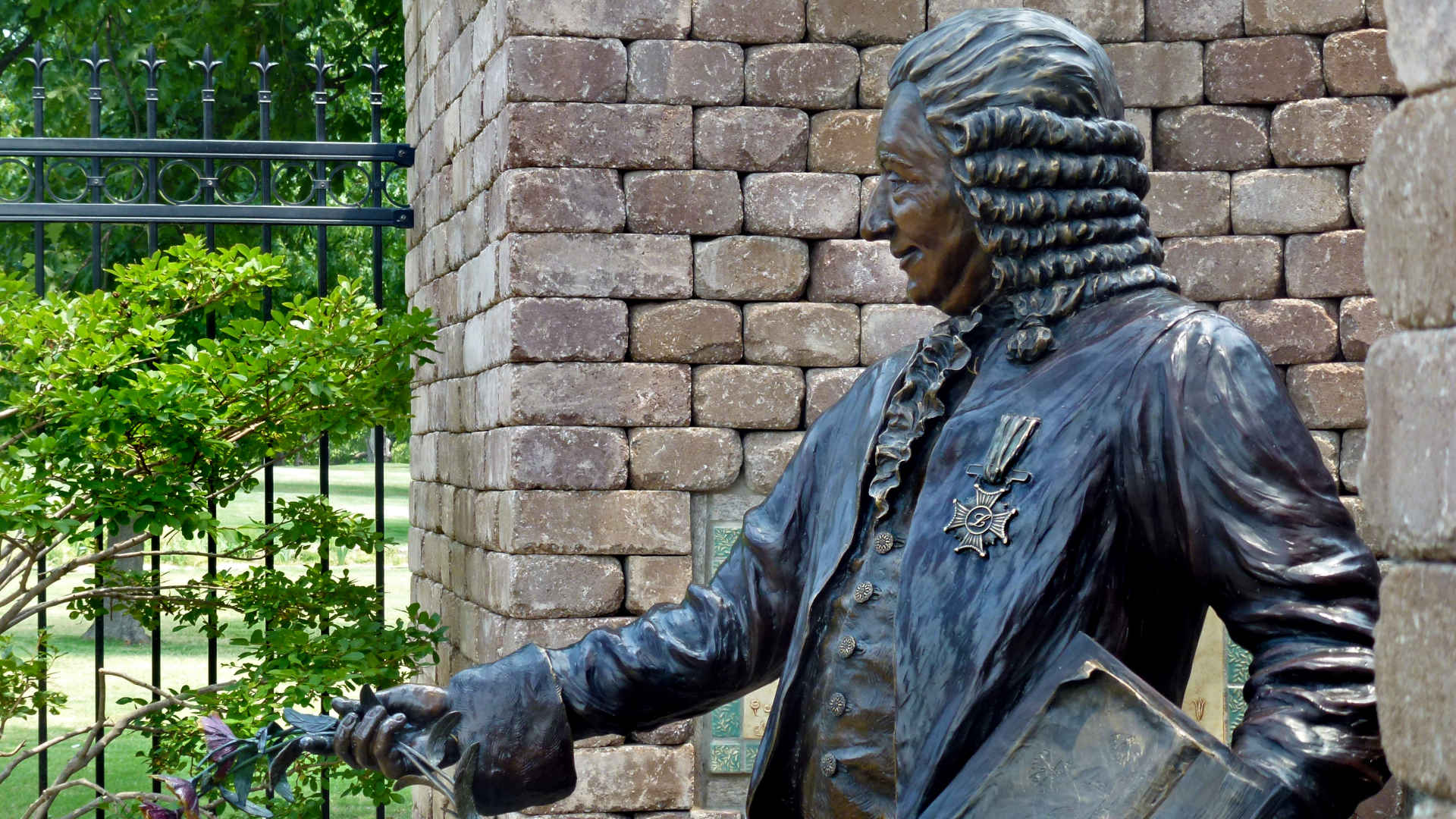New Evidence Revives Old Questions About E.O. Wilson and Race
Did Edward O. Wilson — Harvard professor, iconic biologist, champion of global biodiversity — promote racist ideas? For years, some scientists have suggested the very question is rooted in smear campaigns and misreadings of Wilson’s work. Other scholars have argued that racism and sexism are apparent in Wilson’s writing on human evolution.
Since Wilson’s death in late December 2021, at the age of 92, the question has been subject to renewed debate, after an opinion piece in Scientific American describing Wilson’s “dangerous ideas” set off a backlash from some scientists.
Now, two separate pairs of researchers, drawing from Wilson’s papers at the Library of Congress, have published details of correspondence in which Wilson privately supports a psychologist known for his racist work. “It doesn’t surprise me at all,” said Joseph Graves, Jr., an evolutionary biologist at North Carolina Agricultural and Technical State University who has written extensively about scientific racism, and who reviewed some of the new archival work before it was published. What’s important about the new research, he added, “was coming up with the smoking gun.”
Not everyone agrees the new evidence is so definitive, but the revelations promise to prolong the reckoning over Wilson’s legacy — and to add to an ongoing discussion about how racism and sexism may have shaped entire fields of study.
Wilson may be best known for his widely praised research on ants, and for his push to protect biodiversity. But the scientist’s work on human evolution has been contested since 1975, when he published “Sociobiology: The New Synthesis,” a sweeping study of the evolution of social behavior in animals. The book’s final chapter, which aims to “consider man in the free spirit of natural history, as though we were zoologists from another planet,” touches on the evolutionary origins of language, territoriality, and other behaviors. In the chapter, Wilson wonders whether there could be marked genetic differences between socioeconomic classes. (He concludes there’s little evidence that’s the case.) And he speculates that some of the differences between human cultures could be rooted in genetic differences, calling for “a discipline of anthropological genetics” to explore the question further.
Wilson was touching on questions that remain deeply polarizing: To what extent are certain features of human societies, like xenophobia, altruism, or inequality, dictated by our genes? And can some of the complex variation among human groups, from IQ scores to incarceration rates, be explained by genetic differences, rather than by environmental and social forces? Many racist projects — from the eugenics movement to Nazism to present-day White nationalism — have argued that racial differences have deep genetic roots. Such pseudoscientific ideas continue to fuel popular racist canards, such as the idea that Black people have genes predisposing them to violence.
Today, there’s a broad consensus among experts in human evolution that that race is a social construct, not a biological category, and that it is extraordinarily difficult to link specific genes to complex human behaviors. And some researchers and advocates warn that, absent better data, explorations of those questions often just reproduce old stereotypes — or offer thin cover for bigoted ideas.
After the publication of “Sociobiology,” Wilson was subject to fierce criticism, including from some of his Harvard colleagues, who argued he had gotten out ahead of the scientific evidence — and that his conclusions about the way biology shapes human behavior veered into dangerous territory.
Wilson pushed back against those charges, arguing that his work had been misunderstood and, in some cases, distorted. (“To keep the record straight, I am happy to point out that no justification for racism is to be found in the truly scientific study of the biological basis of social behavior,” he wrote in 1981, stressing his belief in “a single human nature.”) Despite the criticisms, “Sociobiology” was enormously influential: The book helped launch the field of evolutionary psychology, and it had a profound influence on the study of animal behavior and biological anthropology.
Less than a week after Wilson died, Monica McLemore, a health researcher at the University of California, San Francisco, published the op-ed in Scientific American describing Wilson’s work as problematic, and calling on scientists to reckon with his legacy. In response, the science blogger Razib Khan wrote an open letter challenging the way McLemore’s piece characterized Wilson’s work, including “baseless accusations of racism.” Dozens of prominent scientists signed the letter.
The open letter pitted a group of mostly White scientists against a Black colleague who had raised concerns about racism. McLemore, who has received threats and hate mail since her piece was published, questioned the judgment of the researchers who signed it. “That reputable scientists would be sloppy enough to sign a letter that would bring that kind of hate to my stance in this current moment — to me the naivete is huge,” she told Undark in a recent Zoom conversation. (Khan did not reply to requests for comment.)
Some of the letter’s initial signatories retracted their names after learning of Khan’s past connections with figures associated with white nationalism, including alt-right figurehead Richard Spencer and publisher Ron Unz.
Soon after, Wilson’s own connections to the right-wing fringe upended the conversation again.
One pair of researchers who surfaced those connections, Howard University evolutionary biologist Stacy Farina and her husband, Matthew Gibbons, began reading sections of “Sociobiology” while stuck at home during the Covid-19 pandemic. They were taken aback by what they found.
“I had read some chapters of ‘Sociobiology’ as a grad student,” said Farina. “And there’s a lot of really great science in there. It’s a very interesting book. And I had no idea that the last chapter had any of that stuff in it.” Part of her motivation for digging into Wilson’s work, she continued, was a sense of gaps in her own training. “I am frustrated with the lack of education about these issues in evolutionary biology.”
Later, during a Library of Congress workshop for Howard faculty, Farina asked if the Library had archival material on Wilson. Sure enough, the institution holds his personal papers — including boxes of documents related to the sociobiology wars. When she and Gibbons perused the collection, they were drawn to four folders labeled with the name of J. Philippe Rushton, a Canadian psychologist who, starting in the 1980s, published studies arguing that substantial genetic differences existed between racial groups.
“Population differences exist in personality and sexual behavior such that, in terms of restraint, Orientals > whites > blacks,” begins one 1987 Rushton paper published in the Journal of Research in Personality. His work would eventually be dogged by accusations of statistical flaws and ethics violations, and key papers were retracted.

Evolutionary biologist Stacy Farina and her husband, Matthew Gibbons, were surprised by sections of Wilson’s “Sociobiology.” When they dug into archives on Wilson at the Library of Congress, four folders caught their attention.
Visual: Courtesy of Stacy Farina
In 2002, Rushton took the helm of the Pioneer Fund, an organization founded in the 1930s to promote eugenics, the idea that humanity can be improved by manipulating which people reproduce. He led the nonprofit until his death in 2012.
On weekends, Farina and Gibbons began returning to the Library of Congress. It was a “nice little escape during the pandemic,” said Gibbons, who works as a business development specialist for a public health organization. “Head out in the morning, go to an early session, grab some lunch, and sort of freak out over what the morning session revealed, race the clock and try to document as much as we could before they kicked us out at the end.”
The letters, Farina said, demonstrate a warm relationship between Wilson and the psychologist. In the correspondence, which dates from the 1980s and ’90s, Wilson expressed support for Rushton’s work, and lamented a stifling culture that, he suggested, had prevented him from speaking more freely, referring in one note to a “leftward revival of McCarthyism.” When Rushton’s university seemed poised to sanction him for academic misconduct, Wilson sent letters in his defense. He also sent letters to drum up support for Rushton from colleagues at Harvard and at the conservative National Association of Scholars.
Unbeknownst to Farina and Gibbons, a pair of historians were also exploring the Wilson archive. In 2018, University of Illinois historian of science David Sepkoski began working with Wilson’s papers while researching a book on biodiversity. Like Farina and Gibbons, he noticed and gravitated toward the Rushton folders.
Struck by what he was reading, Sepkoski began dropping scanned images of letters into a Dropbox folder he shares with Mark Borrello, a historian of biology at the University of Minnesota. “I’m sure I called you from the archives, and was like, ‘You’re not gonna believe this,’” Sepkoski told Borrello during a recent Zoom conversation with Undark. The two began sketching out a book project on Wilson.
The correspondence, Sepkoski and Borrello now say, suggests that Wilson was carefully managing his public persona — even as he quietly continued his dispute with his left-wing critics.
Providing comments on one Rushton paper — which applied a famous Wilson theory, meant to examine reproductive differences between different species, to argue that Black and non-Black people pursue different reproductive strategies — Wilson was effusive. “This is a brilliant paper,” he wrote, “one of the most original and heuristic written on human biology in recent years.”
“Whether it can even be published in this or some other journal devoted to human sociobiology,” Wilson wrote later in his comments, “will be a test of our courage and fidelity to objectivity in science.”
Earlier this month, spurred by the backlash against McLemore, Farina and Gibbons published their findings in Science for the People Magazine, a left-wing outlet linked to the activist group that prominently opposed Wilson’s work in the 1970s.
Days later, Sepkoski and Borrello published their own essay in The New York Review of Books, with more details from the Wilson archives.
The reaction to the letters among the scientific community has been mixed. Some researchers suggested the revelations do not necessitate a substantial reevaluation of Wilson’s legacy. Asked about the new letters, sociologist Ullica Segerstrale referred back to her influential 2000 book, “Defenders of the Truth,” which covers the dispute between Wilson and his antagonists. In the book, Segerstrale challenges characterizations of Wilson as a racist thinker, and argues that his critics often failed to engage with the actual substance of his work. “I stand by my general analysis in that book regarding the thinking and behavior of both E.O. Wilson and Science for the People,” she wrote in an email to Undark.
At the blog Why Evolution is True, biostatistician Gregory Mayer described Farina and Gibbon’s findings as “small beer.” Wilson, he wrote, appeared to be primarily defending Rushton’s academic freedom, not endorsing his ideas. “To do so does not imply an identity of views,” Mayer wrote. In a phone interview, he suggested that historians should focus on more pressing historical topics, such as Wilson’s role in the development of a key concept in ecology, rather than his correspondence with a discredited Canadian psychologist.
For other scientists, though, the letters felt significant. Writing for Small Pond Science, a science and teaching blog, biologist Terry McGlynn reflected on the letters’ impact. “When navigating the whiter parts of the cultural landscape of biology, the general party line has often been that Ed was mostly right about sociobiology, but his ideas had been twisted by racists, and there wasn’t anything he could do about that,” he wrote.
But, he continued, “it’s indubitable that the party line I have passively received over the decades simply does not comport with reality.”
Not everyone found the content of the letters especially surprising. Indeed, close attention to Wilson’s work and public statements, some scholars said, already provided ample evidence that he was sympathetic to ideas that most biologists now consider not just morally questionable, but scientifically unfounded.
In 2014, Wilson gave a warm blurb to then-New York Times science journalist Nicholas Wade’s book “A Troublesome Inheritance.” The book argues that Black people may be, on average, more impulsive and less hardworking than White or East Asian people, and that basic differences in human society — why Haiti is poor, for example, and European countries wealthy — are attributable to genetic differences among groups. In reviews, debates, and public statements, experts in human evolution pilloried the book for misrepresenting the science. A notable exception was Wilson, who, in his blurb, praised Wade for exemplifying “the virtues of truth without fear” and celebrating human genetic diversity.
“That’s pretty much out in the open,” said Princeton University biological anthropologist Agustín Fuentes, who describes “A Troublesome Inheritance” as “awful, racist, horribly unscientific.” What has changed, he said, is the scientific community itself. The field, he said, “is really hitting a peak moment of reflection, of engagement with the complexities of racism and sexism, and how it’s structured some of the basic ideas.”
Indeed, a recent paper in the journal Nature Ecology and Evolution, authored by faculty, staff, and graduate students in the Department of Ecology and Evolutionary Biology at UC-Santa Cruz, is titled “Anti-racist interventions to transform ecology, evolution, and conservation biology departments.” Recently, biologists have mobilized to change species names that honor Confederate officers and other figures with troubling histories.
“Even just in the last two or three years, it feels like something has shifted,” said Ambika Kamath, a behavioral and evolutionary ecologist at the University of Colorado-Boulder. Among other factors driving that change, she said, is that biologists from more diverse backgrounds are coming into the field.
Kamath is hopeful that the conversation around Wilson will spark broader introspection among her colleagues. The problem, she and some other researchers argue, goes far beyond Wilson. “I don’t really care that Wilson had racist ideas, because I know pretty much all of the people that I dealt with, when I was coming up through the science system, had racist ideas,” said Graves, who in 1988 became the first Black American to receive a Ph.D. in evolutionary biology. “Wilson was just one of many.”
For now, more work from the archives may continue to flesh out a fuller picture of Wilson’s life and thought. Speaking last week, McLemore, the author of the Scientific American op-ed on Wilson, said she was still getting hate mail and threats. “All I wanted to do,” she said, “was to have a more nuanced discussion about the work.”












Comments are automatically closed one year after article publication. Archived comments are below.
I enjoyed this article. As an ex teacher of Psychology I used to impress on students that all humans are fallible and that just because some follow the scientific ‘method’ it does not make them immune to (dare I say!) learned/innate prejudices. I also tried to imprss on them that data from a study is meaningless without some degree of interpretation (a particular problem in Psychology of course) and that interpretation is so very dangerous. This article seems to reitterate those points. One last thing related to the article: Is the concept of ‘race’ therefore different races real?
just reread the article, and it was stated that race is now considered a social constuct. Agree. I think I was thinking about E O Wilson and his assumptions about ‘race’ and not paying attention!
I corresponded with Wilson in the early 70s and met him in the 80s. He was always a gentleman. Sociobiology, which he kept revising until he died, created a big stir, but his statement on the unitary racial composition of us all humans, is ample proof that he was not a racist. Jensen published a long article on IQ and race, and he also was accused of being a racist. I published an article in THE JOURNAL OF NEGRO EDUCATION in 1970 and was spared. When Darwin published THE ASCENT OF MAN he was accused of all kinds of things, and so were other evolutionary scientists. Research at the edges of knowledge is difficult, partly because it exposes the researchers to all kinds of innuendos. I did not know Wilson well enough to call him my friend, but I cannot even speculate that he was a racist. He was a great thinker, and his contributions will endure.
We have moved into an era where people don’t understand that “Social Darwinism” is a bad thing — a dramatically ignorant misreading of the idea of natural selection that was used to justify racism. People think anything with “Darwinism” in the name is good. The field of evolutionary biology, while very interesting and likely able to bring us some smart insights, needs to distinguish itself very carefully from that old heresy and work to make sure Cliffs Notes versions of EB don’t fall back into those mistakes and bad habits. It’s reasonable to look at people with huge bodies of work and recognize that they were working things out and would make mistakes — and it’s good enough for me if a researcher clarifies to definitively say that he does not believe race determines personal and moral characteristics of individuals (e.g. intelligence or altruistic impulses) — because it doesn’t. Anyone who can’t declare that, after reviewing the actual science, is literally a racist. Anyone who can is not, although he may still have flaws in perspective or morality relating to race. Easy peasy.
This is a bit generous to McLemore. She was attacked because she revealed that she was more-or-less faking it (“so-called normal distribution”, my god) when it came to understanding the relevant science, even at an undergraduate level. It seems important to not be a fraud, no? Especially when throwing serious accusations.
This piece, too, is grasping for straws with guilt by association.
I did have a bit of an issue with a black critic being questioned by a crowd of “mostly white” scientists. In the U.S., most random groups will still be “mostly white”, if the article was going to note that I’d like to know if that meant 51% or 99%.
“I did have a bit of an issue with a Black critic being questioned by a crowd of “mostly white” scientists.”
Off limits because Black? Now I’ll remember to remain silent when a Black critic says something dumb.
Apparently my comment was unclear. I have a problem with that being asserted in the article without clarity on what “mostly” white means.
“Today, there’s a broad consensus among experts in human evolution that that race is a social construct, not a biological category, and that it is extraordinarily difficult to link specific genes to complex human behaviors.”
Utter nonsense – intelligence is largely determined by genetics and heritable. That’s an empirical fact, backed up by a century of psychometric study. If intelligence is genetically determined (and it is conclusively), how can it be “extraordinarily difficult to link specific genes to complex human behaviors?” Every “complex human behavior” is a product of intellect.
Your entire piece is garbage.
Not the most intelligent comment, as what you say doesn’t in any way address the assertion in the quote. Look into the difference between individual and population statistics and multiple regression analysis, to start. The pop science shelf of Barnes and Noble (or, for that matter, your average public school social sciences class) is not going to give you a very firm understanding of this stuff.
In the coming decades detailed analysis and indentification of components of DNA will reveal how much it influences intelligence and physical attributes of humans. In time, those who think “that race is a social construct” will face the facts of DNA. There may be a number of genes which together contribute to excellence in playing jazz or sprinting. It may be that people from one area of the planet have more of these genes than people fron other areas. Time will establish this with more or less certainty.
There’s a great deal of information already, although there will be more in coming decades, yes. We do have enough info to know that the complexity of a trait like “excellence in playing jazz” is such that genetic inheritance can’t be determinative. There’s just too many moving parts. It’s bit like thinking a four number PIN would be easy to guess, but then when you get into trying it will take something like ten thousand guesses to find it. People misunderstand what Darwinian evolutionary theory predicts — it is very specific. Gene expression gives an advantage only for survival to reproductive age and only for specific niches. It will give you a longer or shorter beak on one island, and over tens of millions of years it will give you an opposable thumb. And it’s hard to play jazz well without an opposable thumb. But there’s no evolutionary mechanism for creating Louis Armstrong over, well, me.
Wow. A century of psychometric testing? Even now most IQ tests are considered culturally biased and that is only one aspect of the IQ/race issue. Please provide some ’empirical facts’ (silly statement) that show that race is not a social construct. The layering of environmental factors is not given enough credance by yourself. It is difficult to do this as there are so many that we likely still haven’t recognised. finishing off with ‘your entire piece is garbage’ is not worthy of an interesting article. If you disagree with someone you’ll have to do better in reply than this kind of ‘comment’.
The truth is, if he hadn’t been god to many scientists, E. O. Wilson had no contribution to make on the subject of human evolution, not in the manner he delved into it, plain and simple. It’s a serious human failing that he always tries to make a god our of another human. It is also unfortunate that human would like to take credit for what he has not achieved; Wilson had no depth in genetics or sociology. However, he was god, and gods must be worshipped.